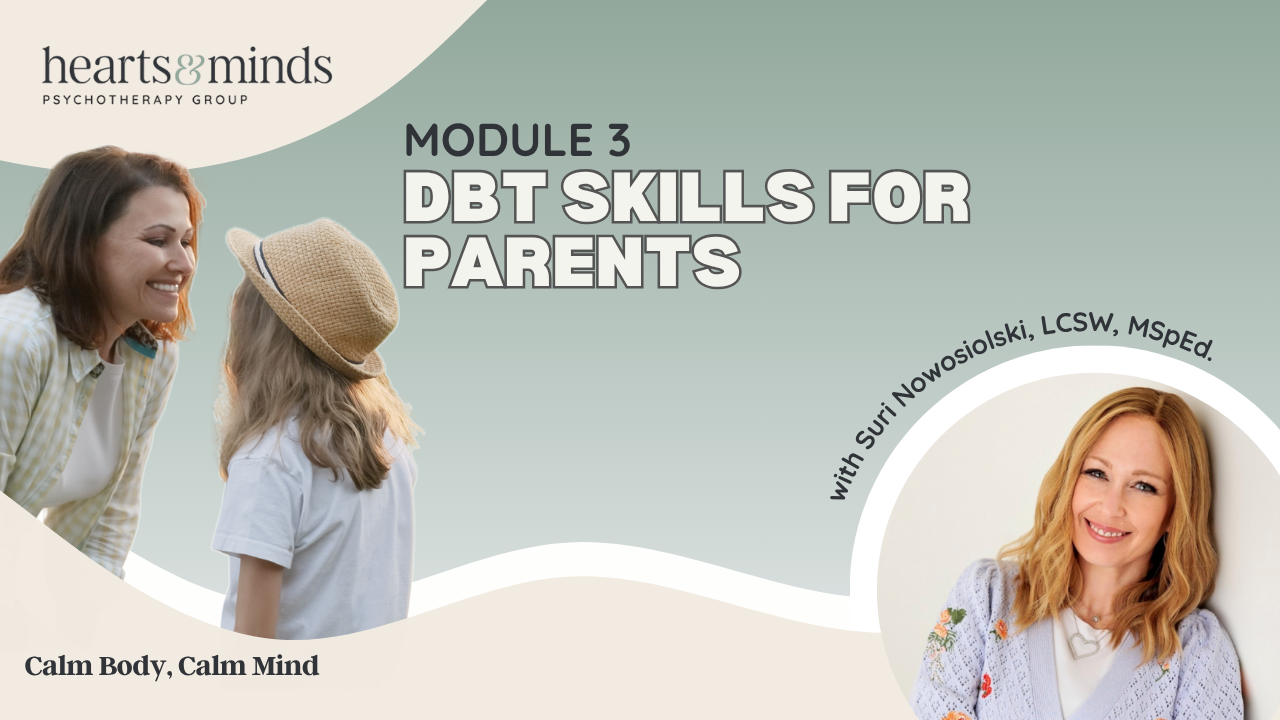Rethinking Gentle Parenting: A DBT-C Approach for Sensitive and Neurodivergent Kids
You tried gentle parenting and feel like your kid walks all over you. Or you tried being firmer and it backfired. You’re not alone.
In a recent Wall Street Journal article titled "Goodbye Gentle Parenting, Hello ‘F—Around and Find Out’," a wave of frustration is evident among parents who feel burned out, ineffective, or disillusioned by what they thought was the "right" way to parent. It captures a cultural moment: parents trading in the mindful, emotion-attuned style of gentle parenting for something tougher, quicker, and consequence-based.
FAFO (short for "F— Around and Find Out") is portrayed as the antidote to permissiveness. A child forgets their coat? Let them shiver. Leaves toys on the floor? Say goodbye to them. It’s parenting by natural consequences, raw and unfiltered.
As a parent of four (and grandparent of nine), and a child and teen therapist with over two decades of experience, I get the pull. You want your child to learn. You don’t want to feel manipulated. You’re exhausted by constant negotiations, emotional meltdowns, and wondering if you’re the only one struggling.
But the debate between "too soft" and "too harsh" misses the real point.
There’s a third path. And DBT-C (Dialectical Behavior Therapy for Children) offers it. If you’re parenting a sensitive or neurodivergent child, DBT-C parenting strategies can help you lead with both compassion and clarity.
What Gentle Parenting Got Right (and Wrong)
At its core, gentle parenting values connection, validation, and emotional safety. It teaches us to pause, regulate ourselves, and try to understand what’s happening underneath our child’s behavior. Those are beautiful and vital tools.
But somewhere along the way, gentle parenting was reduced in pop culture to endless reasoning and soft tones—without the necessary structure, leadership, parental presence and limits that all children, especially deeply feeling or neurodivergent ones, truly need.
Kids thrive on clarity, consistency and boundaries—not punishments. Boundaries that are firm, clear, and held with calm confidence.
What FAFO Gets Right (and Very Wrong)
The FAFO trend calls out a real problem: permissiveness doesn’t prepare kids for life. Natural consequences have a place. Follow-through matters. Kids need to learn that actions have outcomes.
But the viral version of FAFO parenting equates strength with emotional detachment. It uses shame and fear to get compliance. It may "work" in the short term but often leaves children more dysregulated, more defiant—or quietly shut down. It teaches them to hide rather than seek support.
But what’s often missing from the most viral expressions of FAFO is how those consequences are delivered—and how parents show up emotionally in the moment.
When limits are enforced with anger, sarcasm, shame, or emotional distance, the lesson a child receives may not be about accountability at all. Instead, they may internalize that mistakes equal rejection. That expressing emotion isn’t safe. That their parent’s love is conditional on performance or compliance.
It’s not the consequence itself that’s the problem—it’s whether it’s delivered with co-regulation or dysregulation. With calm leadership or reactive frustration. With the goal of skill-building or punishment.
In the short term, FAFO-style consequences might seem effective: a child complies, a behavior stops. But the long-term patterns tell a different story—especially for children with sensitive nervous systems, neurodivergent wiring, or trauma histories.
Instead of developing emotional regulation, kids may learn to suppress or hide their emotions. Instead of turning to their parents for support, they may avoid vulnerability. Instead of internalizing accountability, they may grow more defiant—or quietly ashamed.
And for kids who already feel misunderstood, anxious, or out of sync with the world, this approach can deepen the very dysregulation it aims to resolve.
In real life—not online—many parents who embrace FAFO describe themselves as loving, structured, and exhausted. They’re doing their best to raise capable, respectful kids in a world that can feel overwhelming. And sometimes, they’re reacting to the pressure and ambiguity of modern parenting norms that feel too soft or vague.
But for sensitive kids, kids with trauma histories, PDA or RSD profiles, or neurodivergent wiring, the more extreme applications of this approach can miss the mark. Harsh or exaggerated consequences may lead not to accountability but to invalidation, dysregulation, shutdown, or secrecy. Instead of learning to manage their emotions, kids may learn to hide them. Instead of seeking support, they may fear reactivity.
We can keep the clarity and follow-through that FAFO emphasizes—without compromising emotional safety.
The Middle Path: What DBT-C Offers That’s Missing From the Debate
In DBT-C, we walk the path of dialectics: two truths at once. Your child’s feelings make sense and you can still set boundaries. You can validate their distress and uphold limits. You can be nurturing and firm. A parent can be emotionally attuned and still provide consistent structure.
Compassion and limit-setting are not opposites—they’re both necessary.
What DBT-C Teaches Parents (That Most Trends Miss)
At the heart of DBT-C is this truth:
Children grow best inside relationships that feel safe, steady, and deeply accepting.
That’s why we start with the parent-child relationship—because when your child feels unconditionally loved and understood, they’re more open to your guidance, more resilient during challenges, and more motivated to grow.
Here’s how DBT-C supports parents in building that foundation and shaping behavior effectively:
Build a relationship of emotional safety and unconditional acceptance.
Before change can happen, kids need to know their worth isn’t on the line. DBT-C helps parents communicate: “I love you, even when things are hard.”Model emotion regulation.
You are your child’s emotional thermostat. When big feelings show up, DBT-C teaches you how to stay grounded so you can co-regulate instead of escalate.
“I’m getting frustrated too—let’s both take a breath before we go on.”Validate first.
Not to excuse behavior—but to show your child that their emotions make sense. Validation calms the nervous system and opens the door to learning.
“Of course you're angry—that felt really unfair.”Use reinforcement to shape behavior.
DBT-C emphasizes catching what’s going right. Targeted praise, rewards, and skill-based encouragement are more powerful than punishment in building long-term change.
“You remembered to ask instead of yell—yes! That’s what we’re working on.”Use punishment sparingly and intentionally. Punishments (even natural consequences) are really effective in reducing problem behaviors, but the improvements parents see are usually short-term because while punishment works, it doesn’t teach a child what to do differently next time.
Teach skills. Rather than using fear or shame, DBT-C guides parents to use skill-building strategies that teach, not punish. The focus is always on growth, not control.
DBT-C Shifts the Focus from Punishment to Growth
Traditional punishment can stop a behavior—but it doesn’t teach what to do instead. That’s where DBT-C steps in. We teach parents to respond to misbehavior by helping kids build the very skills they’re missing. Rather than using fear or shame, DBT-C guides parents to use thoughtful, supportive consequences that teach, not punish. The focus is always on growth, not control. For example: “Because you hit your sister, we’re pausing the game. But you can earn it back by repairing with her.” Consequences become a teaching moment—not a power struggle.
With DBT-C, you’re not just managing behavior—you’re building a child’s capacity for emotional insight, flexible thinking, and lifelong resilience.
Real Leadership Looks Like This:
You validate your child's fear of going to school and help them build a ladder back to attendance. You validate their frustration with screen limits and keep the boundary anyway. You say no without yelling. You say yes when it matters. And you do it all without abandoning either your authority or your empathy.
This Isn’t About Tough or Tender—It’s About Being Effective
Some kids are born with sensitive nervous systems. Some are wired for pushback. Some live with anxiety, autism, ADHD, or trauma histories. For these children especially, parenting needs to be both attuned and structured.
We don't need to swing the pendulum between extremes. We need a parenting approach rooted in both science and heart.
That’s what DBT-C offers.
At Hearts and Minds Psychotherapy Group, we specialize in helping parents of deeply feeling and neurodivergent children find that middle path. Our DBT-C parent coaching is grounded in evidence-based care and real-life empathy. You don’t have to choose between connection and authority. You can have both.
Now enrolling for our Skillful Parenting For Sensitive Children parent group. Let’s raise kids who feel seen—and still know how to do hard things.
Want to See DBT-C in Action?
If you’re raising or working with a child who feels things deeply, struggles with anxiety, ADHD, or emotional overwhelm, or seems to go from 0 to 100 in a flash—you’re not alone. And you don’t have to figure it all out on your own.
Our YouTube channel, Hearts & Minds for Kids, is built just for you. Created by Suri Nowosiolski, LCSW—a seasoned child therapist, parent of four big-feeling kids, and proud grandparent of nine—this channel is your go-to hub for short, actionable videos grounded in DBT-C (Dialectical Behavior Therapy for Children).
You’ll find real-life strategies for:
Managing meltdowns and big emotions without escalating
Teaching emotion regulation and mindfulness in kid-friendly ways
Validating feelings while still holding boundaries
Navigating anxious or inflexible behavior with warmth and structure
These are the exact tools we use in some of our therapy sessions at Hearts & Minds Psychotherapy Group—now available for free, anytime you need them. Whether you're a parent, teacher, or clinician, you’ll walk away with clear, compassionate guidance you can use that same day.





